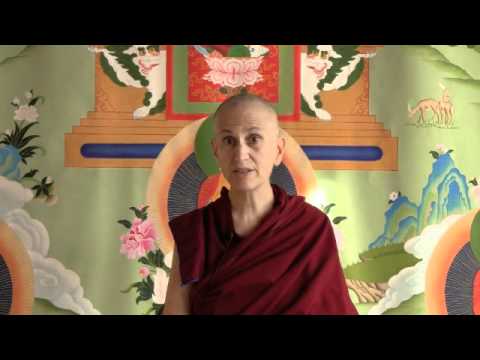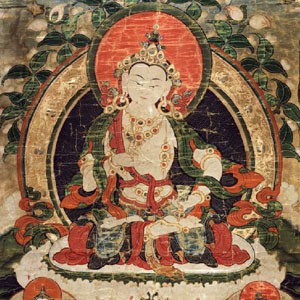Immeasurable joy and equanimity
This talk was given during the White Tara Winter Retreat at Sravasti Abbey.
- Rejoicing in the good qualities of others
- The antidote to jealousy
- The uselessness of comparing ourselves to others
- Developing equal care and concern for everybody
White Tara Retreat 14: Immeasurable joy and equanimity (download)
The last two of the four immeasurables are immeasurable joy and immeasurable equanimity.
Immeasurable joy
Immeasurable joy is rejoicing in the virtue, and good qualities, and talents, and good fortunes of others. It is a very good remedy to jealousy. Especially at this time of year: everybody is saying, “Everybody be happy and live in peace!” We need to spread our good wishes out. Yet, as soon as somebody gets something nicer than we do, or somebody does something better than we do, then all of our good wishes are gone and jealousy kind of comes up and says, “They shouldn’t have it, I should.”
Jealousy is quite an unpleasant emotion and the antidote to it is to rejoice. To really be happy that others have good circumstances, and that they have talents; to especially rejoice in the virtues that others create. This is what we are doing a lot with the retreatants from afar. I don’t know about you, but when I look in the back of the meditation hall and I see all the pictures and all the names of people, I just think about those people doing practice and I feel good inside. I rejoice at what they’re doing. You can just rejoice and be happy with that instead of letting the mind come in that says, “Oh, but maybe their samadhi is deeper. and I’m so distracted and they’re doing sessions longer, and they sit in better posture than I do; they understand the sadhana and I’m completely lost.”
Instead of getting into this really useless thing of comparing ourselves to others, let’s just rejoice at others’ virtue, and rejoice in their abilities and their talents, and leave it at that.
One more thing about immeasurable joy – it’s not just the talents and good things and virtue that people create this life, but really wanting them to have good rebirths in the future and to have the happiness of liberation and enlightenment. Also to really rejoice when they have good rebirths and attain liberation and enlightenment.
Immeasurable equanimity
Equanimity is developing the mind that has equal care and concern for everybody, one that doesn’t play favorites as in liking our friends, hating our enemies, and being apathetic about everybody else. One of the reasons that all this bias is so ridiculous is that we create the compartments of friend, enemy, and stranger depending upon how people relate to us. It’s not like people from their side are inherently worthy of attachment, aversion, or apathy— but just based on how they act to us, we put them in different categories, in different boxes. Then our emotions come from that.
These boxes we put them in are completely irregular and transitory and change in a finger snap. Somebody’s nice to us one day and we love them and we’re so attached, we don’t want to live without them. The next day they hurt our feelings and, “I don’t want to be near this person.” We can see right there that this whole thing of friends, enemies, and strangers, I mean the categories can change just like that, for no other reason except how people treat me— as if that is so important.
I watched it even this morning because we had to take Maitri, our new kitty, to the vet. So Maitri is mad at me every time she goes to the vet, even though Venerable Semkye takes her. Maitri won’t speak to me for many hours afterwards. One day I’m her friend and she’s lying in my lap purring; and then the next day I’m her enemy because I allowed Venerable Semkye to take her to the vet. Now, you would say, “Well, that is the dumb way a cat thinks,” but human beings think the same way and make such frivolous or insubstantial decisions based on a whim like that too. Then we hold grudges, or become attached, or become apathetic about others.
Instead of that, let us realize that we are all the same. None of us wants to go to the vet and we all want to be happy. Therefore we should wish everybody happiness and everybody freedom from suffering, and to see we’re all the same, and to not play favorites and not be biased.
Venerable Thubten Chodron
Venerable Chodron emphasizes the practical application of Buddha’s teachings in our daily lives and is especially skilled at explaining them in ways easily understood and practiced by Westerners. She is well known for her warm, humorous, and lucid teachings. She was ordained as a Buddhist nun in 1977 by Kyabje Ling Rinpoche in Dharamsala, India, and in 1986 she received bhikshuni (full) ordination in Taiwan. Read her full bio.


